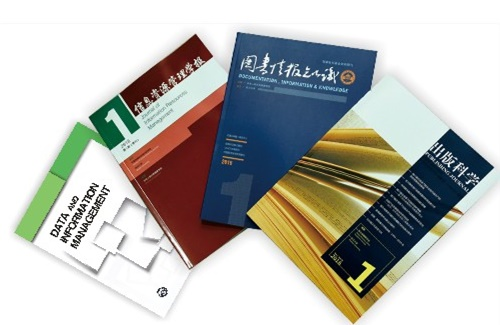Contact Information
School of Information Management,
Wuhan University,
Wuhan, Hubei Province,
P.R.China. 430072
fuling@whu.edu.cn
Academic Journals

Document, Information & Knowledge
Document, Information & Knowledge is a comprehensive academic journal for the national primary subject "library, information and archival management", which has been approved by the General Administration of Press and Publication of the People‘s Republic of China, under the Ministry of Education, sponsored by Wuhan University and managed by the School of Information Management (SIM) of Wuhan University and the Center for Studies of Information Resources (CSIR) of Wuhan University. Since being launched in 1984, it has been rated as excellent periodical of library science for successive five times, as national core Chinese periodical for successive four times, and been listed in Ulrich"s International Periodicals Directory. It has pervasive academic influence at home and abroad. The journal sticks to the tenet of focusing on the state of public‘s knowledge and leading the trend of scientific development, and advocates the ideaology of "human-oriented" and "to integrate theory with practice".
Publishing Science is a professional academic journal published national wide, which has been approved by the General Administration of Press and Publication of the People’s Republic of China, under the Administration of Press and Publication (Copyright Bureau) of Hubei Province, hosted by Hubei Society of Editing Science and managed by the School of Information Management of Wuhan University. Its trial issue was published in 1986 and republished in 1993. From 1993 to 2000, it was published as an in-house publication and approved as an official journal in 2000. Its tenets are: to put emphasis on both theory and practicality, to introduce the expertise in editing and publishing of books, periodicals, audio-video products, electronic publications and on-line publications, and to promote the studies of editing and publishing theories and discipline construction. Ever since coming into beings, Publishing Science exhibits its characteristics by high quality and innovativeness, wins respect from the publishing circles, and has great influence. According to statistics, 83 articles of this periodical have been reprinted by China Publishing Studies annuals (1996-2005), accounting for 1/8 of 637 articles which are published in this periodical in recent ten years and ranking as No.2 among counterparts in China; over 10 articles have been reprinted by Xinhua Digest; over 10 articles are reprinted by RUC Reprint Data from Newspapers and Periodicals Publishing.
Journal of Information Resources Management
Journal of Information Resources Management was established on June 2011, which was a new member of Journal Center of School of Information Management. This journal was hosted by Society of China University Journals and Wuhan University, which was the first academic journal by the same name with the subject name in academic field of Information Resources Management. The main contents involve extensive research fields including theories, approaches and technologies during the process of information resources managing, covering information development and application, information organization and retrieval, information system and integration, information economics and policies and information service and users and so on. This journal provides a communicating platform for information and research publications for professional teachers and students in colleges and universities of information resources management, researchers at home and abroad of relevant professional organizations, information resources managing professionals in government and enterprises, related industry practitioners both at home and abroad.
Data and Information Management
The continuous increase in the volume and detail of data captured by organizations has produced an overwhelming flow of data in either structured or unstructured format. Managing and gaining insights and, more precisely, knowledge from the produced data is a great challenge and key to competitive advantage. The ability to cross-relate private information with information publically available on the Web, and data from social networks, and the analytics solutions to mining structured and unstructured data open a wide range of possibilities for organizations to understand the needs of their customers, and to optimize the use of resources. However, collecting data from various interrelated sources to provide “complete” data, accurate information, and so to generate actionable knowledge to achieve the added value of Big Data also poses challenges for government, academia, and industry.
Data and Information Management (DIM) aims to promote cross-disciplinary data-driven information management research, especially targeting large-scale datasets in scientific/academic, government and business domains. The journal focuses on innovative theories and technologies related to data and information processing; creative applications of theories and techniques including patterns, models, and processes in various datasets; and compatible management processes and social systems required for the realization of the substantial value that data and information offers to organizations.
Specific topic areas may include but not limited to:
• Innovative theories and technologies in data-driven information analytics, including knowledge discovery and organization, cloud computing, machine learning, information visualization, and human-computer interaction
• Information organization and retrieval, and information search behaviors in data intensive environments such as social media
• Open data, information sharing, and information services
• Novel methods, algorithms, and processes of conducting data/text/Web mining
• Scalable semantic annotation and reasoning across distributed data repositories
• Digital humanities, and academic/scientific data analytics and evaluation
• Data curation, information privacy, and information security systems and networks
• New development and expansion of information literacy, including data literacy and media literacy
• Advanced data engineering in smart cities, smart government, smart health, smart education, and financial services
• Novel and impactful applications or case studies in big data and analytics for better managerial decision making in public and private sectors
• Social impact of data and algorithms on individuals and organizations
 Email :
Email : 
